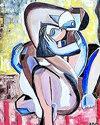Beckett’s M
IF 0.3
4区 社会学
0 HUMANITIES, MULTIDISCIPLINARY
ANGELAKI-JOURNAL OF THE THEORETICAL HUMANITIES
Pub Date : 2022-11-02
DOI:10.1080/0969725X.2022.2139012
引用次数: 0
Abstract
Abstract This essay explores the question of why M figures in the names of all of Beckett’s major characters. I connect M to the word murmuring, which proliferates in his work, and I claim that Beckett was influenced by a passage in Dante’s Purgatorio, in which each face in a group of penitents is inscribed with the letter M. With a rounded eye socket below each arch, the faces of the penitents spell omo or man. I argue that M stands for man – not the humanist form of man that existed for Dante, but rather a ruined figure that is adequate to this moment. Throughout, I engage with critical approaches to Beckett that attempt to connect the posthumanism suggested in his work with the new form of ethics – and of love – that it makes possible.贝克特M
摘要本文探讨了为什么贝克特笔下所有主要人物的名字中都有M的问题。我将M与在他的作品中大量出现的单词murring联系起来,我声称贝克特受到了但丁《炼狱》中一段话的影响,在这段话中,一组忏悔者的每张脸上都刻着字母M。每个拱门下都有一个圆形的眼窝,忏悔者的脸拼写为omo或man,而是一个被毁掉的数字,这一点已经足够了。在整个过程中,我对贝克特进行了批判,试图将其作品中提出的后人道主义与新形式的伦理——以及爱——联系起来。
本文章由计算机程序翻译,如有差异,请以英文原文为准。
求助全文
约1分钟内获得全文
求助全文
来源期刊

ANGELAKI-JOURNAL OF THE THEORETICAL HUMANITIES
HUMANITIES, MULTIDISCIPLINARY-
CiteScore
0.60
自引率
33.30%
发文量
57
期刊介绍:
Angelaki: journal of the theoretical humanities was established in September 1993 to provide an international forum for vanguard work in the theoretical humanities. In itself a contentious category, "theoretical humanities" represents the productive nexus of work in the disciplinary fields of literary criticism and theory, philosophy, and cultural studies. The journal is dedicated to the refreshing of intellectual coordinates, and to the challenging and vivifying process of re-thinking. Angelaki: journal of the theoretical humanities encourages a critical engagement with theory in terms of disciplinary development and intellectual and political usefulness, the inquiry into and articulation of culture.
 求助内容:
求助内容: 应助结果提醒方式:
应助结果提醒方式:


